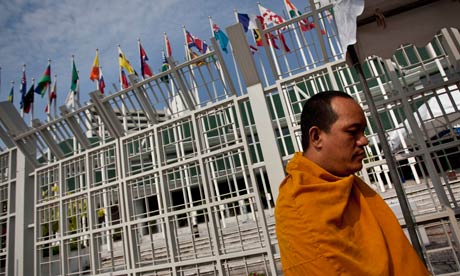Bangkok climate talks stall
Hopes fade of a deal in Durban later this year as deep divisions continue over the fate of the Kyoto protocol
- guardian.co.uk,
- Article history

A Buddhist monk offers prayers and calls on world leaders at the UN climate talks in Bangkok, Thailand, to reduce greenhouse gases. Photograph: David Longstreath/AP
The deep divisions apparently bridged by last December's climate deal in Cancún were reopened this week at UN talks in Bangkok, undermining the chance of any agreement on the shape of a broader pact by the end of this year. The talks, being held in the Thai capital from 3-8 April, stalled on disagreement over an agenda for negotiations through the year ahead of a late November meeting in Durban, South Africa. Developing nations in Bangkok pushed for a sharper focus on the fate of the Kyoto protocol – rich nations' pledges to cut emissions and climate finance for the poor – issues that Cancún did not fully address. The United States and others wanted to focus only on the less contentious Cancún agreements. Christiana Figueres, head of the UN talks, said that while constructive, the meeting had also highlighted continuing divisions between governments, with a central issue being future of Kyoto, the world's main climate change treaty. "Echoes of previous battles have come back to haunt us but a lot of countries do want to see progress and there are some positive signals," said Tim Gore, climate change policy adviser for Oxfam. A series of agreements reached at Cancún included a fund to channel $100bn a year to poor nations by 2020, a scheme to transfer clean energy technology and to hold a rise in global average temperatures below 2C. These steps and others were widely seen as saving the UN climate process from collapse. But in Bangkok differences emerged on how to move ahead and tackle harder issues, particularly the fate of Kyoto. "There's a bit of buyers' regret going on here by developing nations. Except this time there's no refund," a rich nation delegate told Reuters, referring to the view that some poorer nations felt they had conceded too much in Cancún. Kyoto legally binds about 40 industrialised nations to emissions cuts during its 2008-12 first phase. Poorer nations only have to take voluntary steps and are keen to keep this formulation in future, saying hard targets could harm their economic development. The pact was originally meant to be extended into a second period from 2013 with deeper emissions cuts from rich nations. But no successor to Kyoto or another broader pact that binds all major economies is in sight. Agreement in the debate is critical to stepping up the fight against climate change by limiting the rise in global temperatures and reducing the risk of more extreme weather, crop failures and rising seas levels. A tougher climate pact is also crucial in shaping global energy policies and giving investors in low-carbon infrastructure more certainty. It would additionally fuel growth in carbon markets now worth more than $120bn. Many rich nations say Kyoto no longer reflects the reality that developing nations are now the largest, and rapidly growing source of greenhouse gas emissions. They must be brought into a broader pact. Japan, Russia, Canada and the United States, which never ratified Kyoto, are all firmly opposed to extending Kyoto and want a new agreement. India, China and other developing nations disagree, saying Kyoto must remain and that rich nations need to do more to cut emissions. "A second commitment period and the Kyoto protocol is a must. There is no room to make any compromise from my side," senior Chinese delegate Huang Huikang said on Thursday. Analysts saw the fight over Kyoto as far from over. "Emerging economies do not appear close to abandoning Kyoto and any that backs away from the protocol risks a backlash from the rest of the group, reducing the likelihood that any individual country would unilaterally shift its position," said Divya Reddy of political risk consultancy Eurasia Group. Some nations say any backsliding from Kyoto endangered the climate fight. "We haven't got an alternative and an alternative isn't going to happen quick enough. We have to accept that the Kyoto protocol, at least for the next commitment period, is a bridge towards a broader agreement," Ian Fry, the lead delegate from the Pacific island nation of Tuvalu, told Reuters. The United States has been accused of being a roadblock in the talks because of its failure to pass a climate bill and a resurgent Republican party means it cannot boost its pledge to cut carbon by 17% from 2005 levels by 2020.
No comments:
Post a Comment